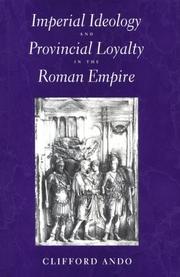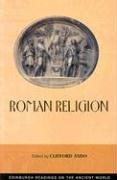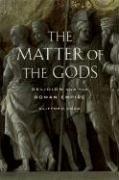| Listing 1 - 10 of 40 | << page >> |
Sort by
|
Book
ISBN: 9780812243543 Year: 2011 Volume: *1 Publisher: Philadelphia : University of Pennsylvania Press,
Abstract | Keywords | Export | Availability | Bookmark
 Loading...
Loading...Choose an application
- Reference Manager
- EndNote
- RefWorks (Direct export to RefWorks)
Roman law --- Public law (Roman law) --- International law (Roman law) --- Methodology. --- Language. --- International law (Roman law). --- Public law (Roman law).
Book
ISBN: 9782503567532 2503567533 Year: 2016 Volume: 172 Publisher: Turnhout : Brepols Publishers,
Abstract | Keywords | Export | Availability | Bookmark
 Loading...
Loading...Choose an application
- Reference Manager
- EndNote
- RefWorks (Direct export to RefWorks)
La religion romaine était une religion légaliste, et les romains pensaient partout et toujours juridiquement?: ce sont les truismes de l'histoire ancienne. Néanmoins, au-delà du sujet du culte public, il n'y a aucune enquête contemporaine sur l'imbrication de la religion et du droit civil. Religion et gouvernement dans l'Empire romain propose d'examiner la sociologie de la religion et la subjectivité politique dans l'empire romain?: l'ascétisme comme discipline du citoyen dans l'antiquité tardive?; la tolérance des pratiques religieuses non-romaines par le gouvernement de l'Empire?; l'improvisation dans les rites romains religieux et juridiques?; et l'utilisation de la citoyenneté comme métaphore pour l'affiliation religieuse, du monde classique à l'empire chrétien. Le livre fournit l'étude moderne la plus détaillée des textes légaux et religieux sur son sujet.
Rome --- Religion --- Religion romaine --- Religion et État --- Politique et gouvernement --- 322 <37> --- Godsdienstige tolerantie. Godsdienstpolitiek--Rome. Oud-Italië --- Religion. --- Politics and government --- 322 <37> Godsdienstige tolerantie. Godsdienstpolitiek--Rome. Oud-Italië --- Godsdienstige tolerantie. Godsdienstpolitiek--Rome. Oud-Italië. --- Religion and state --- Religion et Etat --- --Religion et État --- --Religion --- --Rome ancienne --- --Rome --- Civilization --- 30 B.C.-476 A.D. --- --Religion and state --- Religion romaine. --- Religions --- --Religion romaine. --- --322 <37> --- Rome ancienne

ISBN: 0520220676 9780520220676 0520280164 0520923723 1597346721 Year: 2000 Volume: 6 Publisher: Berkeley : University of California Press,
Abstract | Keywords | Export | Availability | Bookmark
 Loading...
Loading...Choose an application
- Reference Manager
- EndNote
- RefWorks (Direct export to RefWorks)
The Roman empire remains unique. Although Rome claimed to rule the world, it did not. Rather, its uniqueness stems from the culture it created and the loyalty it inspired across an area that stretched from the Tyne to the Euphrates. Moreover, the empire created this culture with a bureaucracy smaller than that of a typical late-twentieth-century research university. In approaching this problem, Clifford Ando does not ask the ever-fashionable question, Why did the Roman empire fall? Rather, he asks, Why did the empire last so long? Imperial Ideology and Provincial Loyalty in the Roman Empire argues that the longevity of the empire rested not on Roman military power but on a gradually realized consensus that Roman rule was justified. This consensus was itself the product of a complex conversation between the central government and its far-flung peripheries. Ando investigates the mechanisms that sustained this conversation, explores its contribution to the legitimation of Roman power, and reveals as its product the provincial absorption of the forms and content of Roman political and legal discourse. Throughout, his sophisticated and subtle reading is informed by current thinking on social formation by theorists such as Max Weber, Jürgen Habermas, and Pierre Bourdieu.
Allegiance --- -Political stability --- -Destabilization (Political science) --- Political instability --- Stability, Political --- Loyalty, Political --- Political loyalty --- Rome --- Cultural policy --- -Influence. --- History --- Provinces --- -Administration. --- Political stability --- Roman provinces --- Administration. --- Influence. --- Allégeance --- Stabilité politique --- Politics and government --- Administration --- Politique et gouvernement --- Histoire --- State governments --- Destabilization (Political science) --- Consensus (Social sciences) --- Legitimacy of governments --- Loyalty --- Citizenship --- Patriotism --- Rim --- Roman Empire --- Roman Republic (510-30 B.C.) --- Romi (Empire) --- Byzantine Empire --- Rome (Italy) --- Allegiance - Rome. --- Political stability - Rome. --- Influence --- administration. --- allegiance. --- ancient rome. --- ancient world. --- augustus. --- body politic. --- bourdieu. --- bureaucracy. --- central government. --- christian ideology. --- empire. --- fall of the empire. --- government. --- habermas. --- history. --- imperial identity. --- max weber. --- nonfiction. --- political consensus. --- political stability. --- politics. --- power struggle. --- power. --- provinces. --- provincial loyalty. --- revolt. --- roman emperors. --- roman empire. --- roman government. --- roman history. --- roman military. --- roman senate. --- rome. --- social formation.

ISBN: 0748615652 0748615660 9780748615650 9780748615667 Year: 2003 Publisher: Edinburgh : Edinburgh University Press,
Abstract | Keywords | Export | Availability | Bookmark
 Loading...
Loading...Choose an application
- Reference Manager
- EndNote
- RefWorks (Direct export to RefWorks)
Rome --- Religion --- Religion. --- Religion - Rome
Book
ISBN: 9780812204889 0812204883 1283897989 0812243544 Year: 2011 Publisher: Philadelphia University of Pennsylvania Press
Abstract | Keywords | Export | Availability | Bookmark
 Loading...
Loading...Choose an application
- Reference Manager
- EndNote
- RefWorks (Direct export to RefWorks)
Law, Language, and Empire in the Roman Tradition demonstrates how Roman civil law functioned as an instrument of empire by tracking its application to the challenges of governing diverse and distant people.
HISTORY --- Ancient / Rome --- Roman law --- Public law (Roman law) --- International law (Roman law) --- Law - Non-U.S. --- Law, Politics & Government --- Law - Europe, except U.K. --- Civil law --- Civil law (Roman law) --- Law --- Law, Roman --- Roman international law --- Public law --- Methodology --- Language --- E-books --- Law - Non-U.S --- Law - Europe, except U.K --- Language. --- Methodology.

ISBN: 9780520250833 0520250834 Year: 2008 Volume: 44 Publisher: Berkeley (Calif.) : University of California press,
Abstract | Keywords | Export | Availability | Bookmark
 Loading...
Loading...Choose an application
- Reference Manager
- EndNote
- RefWorks (Direct export to RefWorks)
Rome --- Religion. --- 292.2 --- 292.2 Godsdiensten van de Romeinen --- Godsdiensten van de Romeinen --- Religion --- Religion romaine
Book
ISBN: 9780748620517 9780748620500 0748620516 0748620508 0748629203 1282059246 9786613799081 Year: 2012 Volume: *6 Publisher: Edinburgh : Edinburgh University Press,
Abstract | Keywords | Export | Availability | Bookmark
 Loading...
Loading...Choose an application
- Reference Manager
- EndNote
- RefWorks (Direct export to RefWorks)
A pioneering history of this period of crisisThe Roman empire during the period framed by the accession of Septimus Severus in 193 and the rise of Diocletian in 284 has conventionally been regarded as one of crisis. Between 235 and 284, at least eighteen men held the throne of the empire, for an average of less than three years, a reckoning which does not take into account all the relatives and lieutenants with whom those men shared power. Compared to the century between the accession of Nerva and the death of Commodus, this appears to be a period of near unintelligibility. The middle of the c
Rome --- History --- Politics and government --- Economic conditions --- Histoire

ISBN: 1282762257 9786612762253 0520933656 9780520933651 9780520250833 0520250834 9781282762251 0520259866 9780520259867 9780520259867 0520259866 Year: 2008 Publisher: Berkeley : University of California Press,
Abstract | Keywords | Export | Availability | Bookmark
 Loading...
Loading...Choose an application
- Reference Manager
- EndNote
- RefWorks (Direct export to RefWorks)
What did the Romans know about their gods? Why did they perform the rituals of their religion, and what motivated them to change those rituals? To these questions Clifford Ando proposes simple answers: In contrast to ancient Christians, who had faith, Romans had knowledge, and their knowledge was empirical in orientation. In other words, the Romans acquired knowledge of the gods through observation of the world, and their rituals were maintained or modified in light of what they learned. After a preface and opening chapters that lay out this argument about knowledge and place it in context, The Matter of the Gods pursues a variety of themes essential to the study of religion in history.
HISTORY / Ancient / General. --- Rome --- Religion. --- ancient christianity. --- ancient christians. --- ancient church. --- ancient religion. --- ancient rome. --- ancient world. --- antiquity. --- belief. --- christian. --- christianity. --- classical world. --- classics. --- faith. --- imperialism. --- paganism. --- philosophical. --- philosophy. --- religion. --- religious ritual. --- religious studies. --- roman empire. --- roman gods. --- roman history. --- western world. --- world history.

ISBN: 0520923723 1597346721 9780520923720 0585394598 9780585394596 0520220676 9780520220676 9781597346726 Year: 2000 Publisher: Berkeley University of California Press
Abstract | Keywords | Export | Availability | Bookmark
 Loading...
Loading...Choose an application
- Reference Manager
- EndNote
- RefWorks (Direct export to RefWorks)
The Roman empire remains unique. Although Rome claimed to rule the world, it did not. Rather, its uniqueness stems from the culture it created and the loyalty it inspired across an area that stretched from the Tyne to the Euphrates. Moreover, the empire created this culture with a bureaucracy smaller than that of a typical late-twentieth-century research university. In approaching this problem, Clifford Ando does not ask the ever-fashionable question, Why did the Roman empire fall? Rather, he asks, Why did the empire last so long? Imperial Ideology and Provincial Loyalty in the Roman Empire argues that the longevity of the empire rested not on Roman military power but on a gradually realized consensus that Roman rule was justified. This consensus was itself the product of a complex conversation between the central government and its far-flung peripheries. Ando investigates the mechanisms that sustained this conversation, explores its contribution to the legitimation of Roman power, and reveals as its product the provincial absorption of the forms and content of Roman political and legal discourse. Throughout, his sophisticated and subtle reading is informed by current thinking on social formation by theorists such as Max Weber, Jürgen Habermas, and Pierre Bourdieu.
Allegiance --- Political stability --- Roman provinces --- State governments --- Destabilization (Political science) --- Political instability --- Stability, Political --- Consensus (Social sciences) --- Legitimacy of governments --- Loyalty, Political --- Political loyalty --- Loyalty --- Citizenship --- Patriotism --- Administration. --- Rome --- Rim --- Roman Empire --- Roman Republic (510-30 B.C.) --- Romi (Empire) --- Byzantine Empire --- Rome (Italy) --- History --- Influence. --- Cultural policy --- Allegiance - Rome. --- Political stability - Rome. --- administration. --- allegiance. --- ancient rome. --- ancient world. --- augustus. --- body politic. --- bourdieu. --- bureaucracy. --- central government. --- christian ideology. --- empire. --- fall of the empire. --- government. --- habermas. --- history. --- imperial identity. --- max weber. --- nonfiction. --- political consensus. --- political stability. --- politics. --- power struggle. --- power. --- provinces. --- provincial loyalty. --- revolt. --- roman emperors. --- roman empire. --- roman government. --- roman history. --- roman military. --- roman senate. --- rome. --- social formation.
Book
ISBN: 1442622490 9781442622494 9781442650176 1442650176 1442622504 Year: 2018 Publisher: Toronto : University of Toronto Press,
Abstract | Keywords | Export | Availability | Bookmark
 Loading...
Loading...Choose an application
- Reference Manager
- EndNote
- RefWorks (Direct export to RefWorks)
"In an expansion of his 2012 Robson Classical Lectures, Clifford Ando examines the connection between the nature of the Latin language and Roman thinking about law, society, and empire. Drawing on innovative work in cognitive linguistics and anthropology, Roman Social Imaginaries considers how metaphor, metonymy, analogy, and ideation helped create the structures of thought that shaped the Roman Empire as a political construct. Beginning in early Roman history, Ando shows how the expansion of the empire into new territories led the Romans to develop and exploit Latin's extraordinary capacity for abstraction. In this way, laws and institutions invented for use in a single Mediterranean city-state could be deployed across a remarkably heterogeneous empire. Lucid, insightful, and innovative, the essays in Roman Social Imaginaries constitute some of today's most original thinking about the power of language in the ancient world."-- From publisher's website.
Latin language --- Roman law --- Cognitive grammar. --- Cognitive linguistics --- Grammar, Comparative and general --- Psycholinguistics --- Law --- Classical languages --- Italic languages and dialects --- Classical philology --- Latin philology --- Language. --- Language --- Rome --- Rim --- Roman Empire --- Roman Republic (510-30 B.C.) --- Romi (Empire) --- Byzantine Empire --- Rome (Italy) --- Languages --- Political aspects. --- History
| Listing 1 - 10 of 40 | << page >> |
Sort by
|

 Search
Search Feedback
Feedback About
About Help
Help News
News